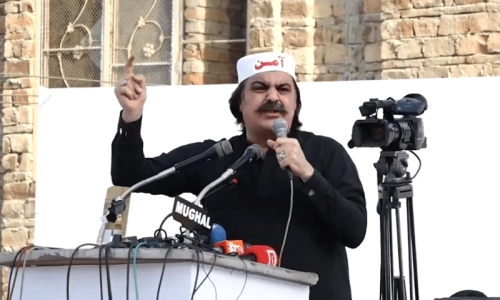DID we really need Cynthia Ritchie to tell us how wonderful Pakistanis are or how beautiful Kaghan and Naran are? Why should we be more impressed with or inclined to believe foreign accounts of our own country?
Last April, the Pakistani government rolled out the red carpet for foreign travel bloggers at the Pakistan Tourism Summit held in Islamabad, but excluded locals who had been working on promoting tourism in Pakistan for years. Later, one of the bloggers, an American woman, complained that she was silenced when she wanted to be honest about her assessment of travelling in Pakistan.
Although her criticisms of the tourism infrastructure in Pakistan, which she later uploaded in a video, were reasonable and should have been heeded, the basic lesson wasn’t learned by Pakistani authorities. Making promotional videos about Pakistan by wining, dining and providing elaborate security to foreign influencers isn’t going to change minds about Pakistan globally.
If we want to be respected internationally, there is only one way to earn it. By treating our own citizens right. And that means all shades of citizens. If local media is gagged, opposition figures jailed, and professors charged with blasphemy, no female social media influencer riding a motorbike or a donkey cart can whitewash that record.
Pakistanis can only be respected abroad if they are respected at home.
Pakistanis can only be respected abroad if they are respected at home. That means that grass-roots activists shouldn’t go missing no matter how bitter their message. It also means that if we criticise Modi for going back on Nehru’s secular promise to Muslims in India, we must also honestly assess why we went back on a similar promise made by Jinnah to non-Muslims in Pakistan. And if we are keen to make so many allowances for foreign women to experiment in the public space in Pakistan, why do we come down so hard on the local female organisers of the Aurat March?
The world is moving on. Western cities, from Auckland to Los Angeles, have seen massive protests against racism and police brutality and discrimination against people of colour. The statue of Winston Churchill in London had to be boarded up so that protesters wouldn’t take it down, as they have many others. A fabled war hero to many, Churchill was also a racist responsible for the Bengal famine of 1943, which killed up to three million people.
History is being revisited, the past confronted. At the root of the protests is the idea that it is no longer alright to violate the rights of indigenous people or immigrants. One can’t help but marvel at the scale and momentum of this movement. And yet one must pause to think where we stand in the dispensation of justice and according citizens basic rights.
Naqibullah Mehsud comes to mind. Like George Floyd, he too was killed by the police. Both cases sparked protests. And yet here we are, two years after Naqib’s death, suppressing those protests, nowhere close to punishing the perpetrators, his old father also dead — and buried with him is the promise of justice for his son’s wrongful murder.
Not only could we not tolerate the idea of questioning authority, we went so far as to suppress an art exhibition by Adeela Suleman that tried to commemorate the hundreds who were extra-judicially killed by law enforcement at the Karachi Bienniale last year.
While Ali Wazir, a leader of the Pashtun Tahaffuz Movement, was denied the right to speak at the Faiz Festival in Lahore last year and earlier Lums had to cancel a talk scheduled with Baloch leader Mama Qadeer, Niall Ferguson, a controversial figure who promotes British colonialism, was invited to Thinkfest this year.
Trampling over grass-roots activists or ignoring hardworking indigenous travel bloggers while seeking validation from the likes of Cynthia and Niall isn’t about to change Pakistan’s fortunes. Far better to invest in local talent and hear what they have to say, even if it isn’t pleasant.
Instead of focusing on why some of our people cannot openly share their experiences with fellow Pakistanis while controversial foreigners like Niall and Cynthia can, Asad Umar resorts to condemning the scientific modelling of the coronavirus threat in Pakistan emanating from a renowned Western university as ‘goray ki ghulami’. One cannot help but question then, if tomorrow, a coronavirus vaccine trial at Imperial or Oxford University proves successful, will Mr Umar refuse to adopt it?
Instead of reacting with hypersensitivity any time the Pakistani government isn’t painted in a flattering light, we should be focusing on the root causes, the denial of free speech and democratic participation locally, that results in our education lagging behind others. And while the children of the elite, Mr Umar included, can still benefit from a progressive Western education, the rest of the country isn’t so fortunate.
The writer is a lawyer who lives in London.
Twitter: @ayeshaijazkhan
Published in Dawn, June 22nd, 2020














































